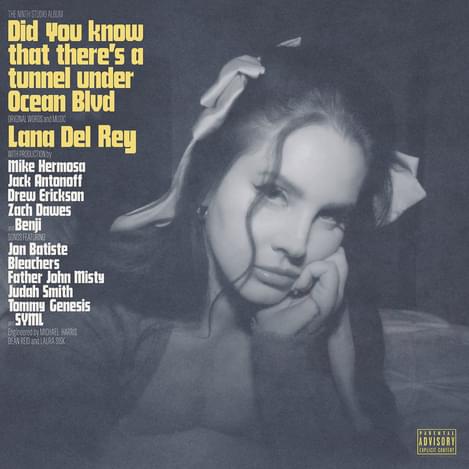On her ninth album, Lana Del Rey continues to astound and confound in equal measure
"Did You Know That There's a Tunnel Under Ocean Blvd"

At this point in her career, Lana Del Rey plays for nobody but herself. Why follow trends which you yourself helped to set?
For half a decade, ever since 2017’s Lust For Life, I don’t think she’s attempted to write a hit. On her last three albums, including 2019’s widely adored Norman Fucking Rockwell, she started writing songs which were noticeably unbothered by whatever was happening in the charts. She became a songwriter's songwriter, penning songs which were unafraid to be slow, unadorned and bracingly personal: a notorious student of Hollywood glamour who now seems interested only in unflattering truths.
This change occurred when she struck up a partnership with producer Jack Antonoff, whose work isn’t without its critics. His credits read like a list of this era’s defining artists, but I’m sympathetic to the accusation that his work with Lorde, The 1975 and Taylor Swift overstep the producer’s role; taking the sounds of those eclectic artists and remaking them in his own image. It must be said though, that his partnership with Lana has been incredibly fruitful. Ever since Rockwell, he’s known how to frame her best songwriting and, once again, here he conjures an apt mood for an album which is as elegant and it is unguarded. String instruments don’t just soar, they clatter and creak, and piano notes ring as sharp as glass. Lana’s voice remains omnipresent; central, even when she’s singing tenderly.
Despite the range of Lana’s catalogue as it grows, these sixteen songs are easily among her most complicated, emotionally; pensive and optimistic, often at the same time. Across the tracklist she asks searching, open questions about motherhood, self-worth and the legacy of family. She pays homage to her grandparents, her niece and her father, while making clear that her own place in the world is one she’s less sure of. “Fuck me to death”, she sings on the albums’ title track, “love me until I love myself.”
Even with such searching material, her pen remains amongst the sharpest working today. She can be funny (“I met my boyfriend down at the taco-truck”) and, when she sings about rape on “A&W,” she can also be shockingly frank. Sonically, this is another album which sounds designed to sit on a shelf with the classics. “Sweet” plays like vintage Carole King, while “Paris, Texas” enters fresh territory; a twinkling and playful piano pulling in the direction of Vashti Bunyan and other legends of the English folk-revival. “Let The Light In,” the best of her numerous collaborations with Father John Misty, is a total gem; a straight-down-the-line Jackson Browne-rocker, the kind which would have been a hit on FM radio in ‘73. In fact, the three-song stretch from “Grandfather Please Stand On The Shoulders…” to “Margaret” stakes a claim as among the very best from her nine albums to date.
However, in equal measure, Del Rey’s singular mindset can result in indulgences which threaten to derail the whole album entirely. On a 77 minute record, do we really need two interludes (one being a four-minute sermon from a megachurch pastor) and a remix of “Venice Bitch,” far inferior to the original? “Margaret” is a perfect album closer, but it’s not this one’s. Instead, the record staggers on into “Fishtail,” a dull trap ballad, and hits a dead-end with “Peppers,” an excursion into rap which is an absolute mess; so incoherent that it's excruciating.
Moments like these are baffling because, without them, Did You Know… would compete among Lana’s very best. In fact, in certain gorgeous moments – like during the strange haziness of “Fingertips” or the ecstatic climax of “The Grants” – this is a beautiful album. Lana has grown stratospherically as an artist since she stopped giving a damn, but freedom isn’t all sunshine and roses. As this record proves, it can be complicated, nerve-racking, and more than a little messy too.
Get the Best Fit take on the week in music direct to your inbox every Friday

Tunde Adebimpe
Thee Black Boltz

Julien Baker & TORRES
Send A Prayer My Way

Bon Iver
SABLE, fABLE





